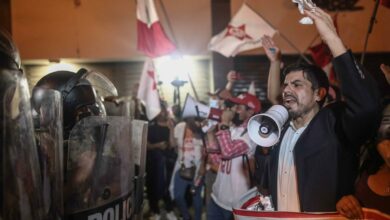Army tightens security in Fiji amid fears of post-election conflict

Sydney, Australia, Dec 22 (EFE).- Fijian police announced Thursday they would work together with the army to avoid racial conflicts in the country after disputed elections held last week, after which the opposition announced an agreement to form a coalition government.
Senior officials in the security forces took the move after meeting with acting Fijian Prime Minister Frank Bainimarama, who led the 2006 coup and headed the Fiji First party list.
“This is a consensual decision,” said Fiji Police Commissioner Sitiveni Qiliho, adding that he had received “information about plans for civil unrest” in a statement published Thursday on his institution’s social media.
The deployment of the military took place after the Popular Alliance of the opposition leader, Sitiveni Rabuka, of Indian descent, announced on Tuesday a coalition to govern together with the Social Democratic Liberal Party (Sodelpa) and the National Federation Party.
This pact was called into question less than 24 hours after its announcement, when the general secretary of Sodelpa, Lenaitasi Duru, denounced “irregularities” Wednesday during the vote within his formation.
For his part, Fiji’s Secretary General Aiyaz Sayed-Khaiyum said that although he acknowledged the results of the elections, in which Bainimarama and Rabuka were tied, he denied the validity of the opposition coalition.
The police commissioner said Thursday that the deployment together with the military is based on intelligence and official reports, as well as on-the-ground assessments. This suggest that “minority groups continue to be targeted,” without specifying the alleged attacks on homes and businesses of Fijians of Indian origin, which represents 38 percent of the population.
Tess Newton Cain, an expert in Pacific affairs from Australia’s Griffith University, said the military deployment is “a significant and worrying event,” questioning the measure adopted with the approval of Bainimarama.
“Where is the evidence to support this measure: how many incidents? How many people involved? How many arrests have been made? How many charges have been filed?” the academic said Thursday on Twitter.
Meanwhile, Fijian lawyer Bhumika Khatri said Thursday on her social media that the Indian minority – to which she belongs – has felt “completely safe” before, during and after the elections.
Fiji’s parliament does not currently have a date for the first session after the elections, where it is expected that, if the opposition alliance continues, Rabuka, of Indian origin and instigator of the 1987 military coup and prime minister between 1992 and 1999, will be re-elected.
Bainimarama, who said during the vote that he would abide by the result, came to power after leading a coup in 2006 and later won the 2014 and 2018 elections.
Fiji, which has more than 900,000 inhabitants, has a constitution approved in 2013 without citizen consultation and has suffered great tension between the Melanesian Fijian community and that of Indian origin since its independence from the United Kingdom in 1970. EFE
wat/lds





